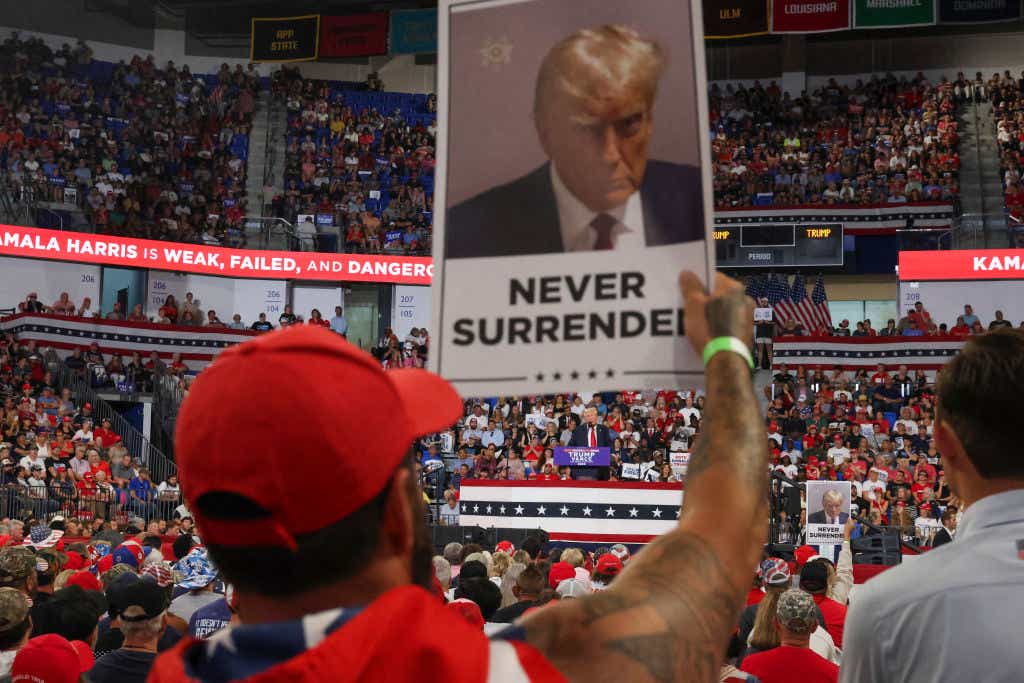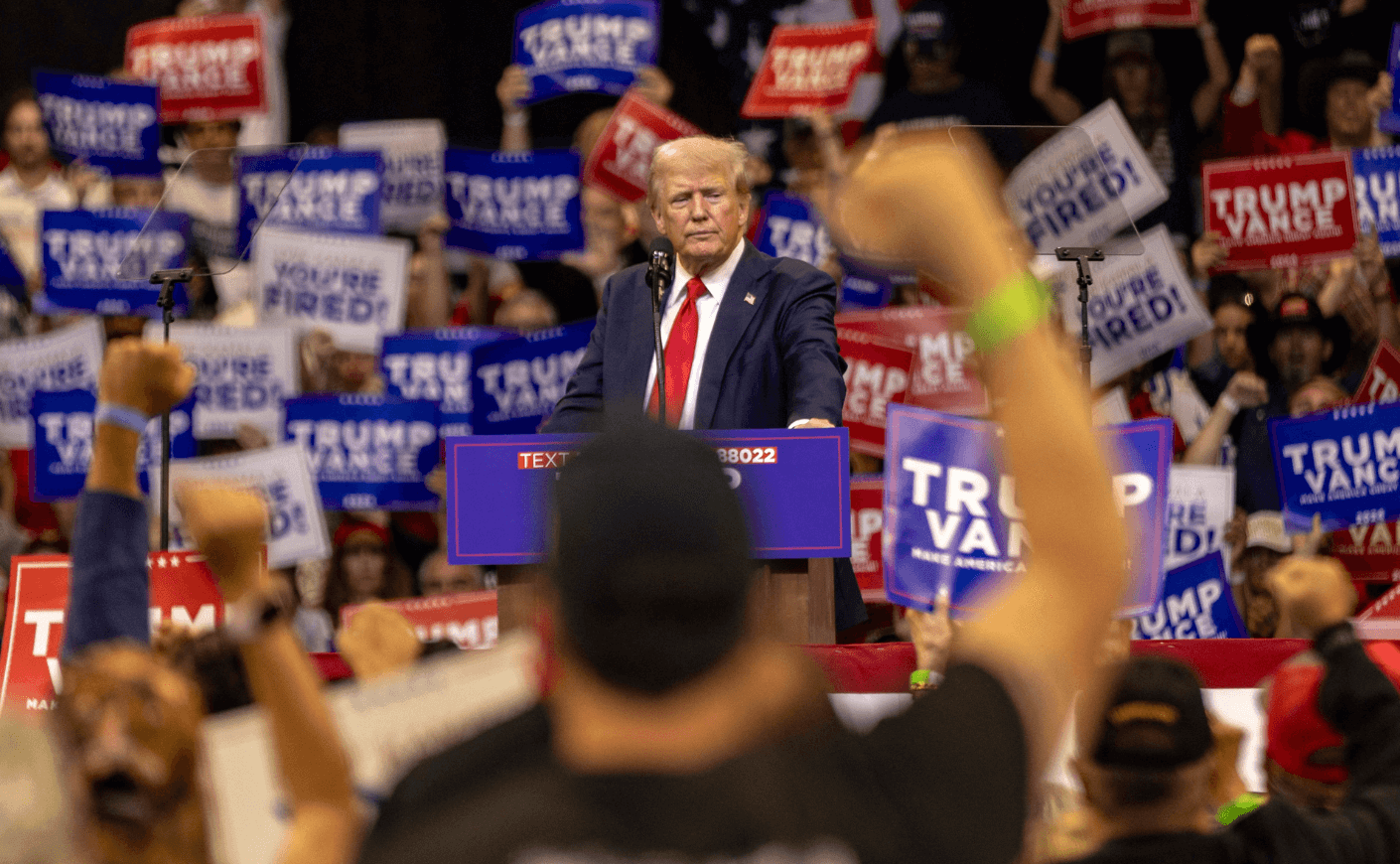After she announced her intention to run in 2024, it didn’t take long for the Democratic Party to unite behind Vice President Kamala Harris, transforming the race for the White House. Yet no matter how things change in this historically unpredictable election, one thing stays the same: former president Donald Trump’s enduring electoral power.
Few politicians in U.S. history have commanded such loyalty from so many. Despite the former president facing headlines on a near-weekly basis that would’ve ended any other candidate’s political career, none have broken Trump’s grip over a remarkably dedicated and broad base of support. But he also maintains appeal beyond his MAGA base.
While polling is in flux since Harris took over, it holds true that Trump could potentially attract historic numbers of reliably Democratic constituencies. Hispanic voters have steadily shifted in his direction in recent years. Young Black Americans are now considered swing voters. Gen Z Americans, particularly young men, are increasingly keen on the former president.
But Trump’s most powerful pull is among the white working-class. Before Trump, GOP nominees dating back to George H.W. Bush won an average of 45% of this cohort, giving Democrats a narrow but powerful advantage in crucial states. Trump has averaged more than 60% among this key bloc, which includes union members, factory workers, and blue-collar voters living paycheck to paycheck.
For those who oppose him, the question becomes why Trump is so resilient, so politically powerful, and so tough to vanquish? Why does he resonate with so many voters?

We can start with the fact that, in the current election, the top issues for voters happen to be strong issues for Trump: the economy, immigration, inflation, and crime. This creates a natural opening for him. I’ll come back to this later, but it would be wrong to chalk up his wide support to policy alone.
Key to understanding Trump’s sustained appeal, particularly from his dedicated and long-term base, is plummeting faith in American institutions. Polling has consistently shown that faith in the leading power centers of society is cratering to all-time lows, with less than a quarter of Americans — and falling — having faith in the media, government, the judicial system, and other elite bodies.
When people have contempt for established institutions, they tend to seek out anti-establishment leaders. This helps explain why persistent attacks from so-called “elites” only make Trump stronger. In the eyes of many, he’s hated by all the right people. Their disdain is a sign that he must be doing something right.
To Americans who see it this way, the former president is the most authentic voice to ever come to Washington. While Trump’s critics claim his rhetoric is filled with mistruths, his supporters see a willingness to make authentic statements against the status quo that no one else dares to utter.
In 2016, this authenticity that many in the electorate saw in Trump made him a powerful foil to not just Hillary Clinton, but to the cadre of elected Republicans that he beat in the primaries. Fairly or not, these politicians were perceived as overly concerned with saying the “right” things to whichever audience they happened to be in front of. Trump constantly says statements that no pollster or political consultant would recommend. While his opponents see this as his greatest weakness, those mistrustful of elites see it as courage and honesty.
I saw this in action when I worked on Marco Rubio’s presidential campaign in 2016. We didn’t realize it at the time, but if you had “governor” or “senator” in your name, you had little chance of winning that race. The GOP electorate had grown distrustful not just of institutions broadly, but of their own party leaders. Trump’s lack of experience in elected office was an asset.
While this distrust in elites existed then, it has been turbocharged in the years since — partly, many would argue, because of the reaction that Trump and his supporters have received from the establishment. This has galvanized and solidified his base of support, allowing him to skate through the 2024 Republican primary with ease.
Whether this translates to victory in November is another question. This election will come down to roughly 100,000 swing voters in key battleground states, including in my home state of Wisconsin.

Harris and Trump have only a few months left to make their cases. This short runway likely favors Harris, who is untested as a top-of-the ticket campaigner in a national general election and will attempt to run out the clock while taking as few risks as possible.
For Trump to win, he needs to focus on the policies that matter most to swing voters: the economy, immigration, inflation, and crime. These tend to favor him, as the Biden-Harris administration has overseen a 20% increase in inflation and a more than 200% surge in illegal immigration. To break through, he’ll need to speak not only to his political base but make this race about the future of all Americans.
Trump’s legacy will continue to be written in these coming months. Whether he ends his career with a loss or whether his hold on voters proves strong and enduring enough to send him back to the highest office in the land will depend on how he plays his cards. But win or lose, one thing is certain: American politics has never seen someone quite like Trump, and likely never will again.
Matt Terrill is the managing partner of Firehouse Strategies and served as the chief of staff on Florida Sen. Marco Rubio's 2016 presidential campaign.









